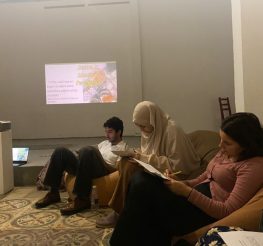January 25th: The Revolution of Twitter in Egypt

Cairo 360
It’s safe to assume that social media tools in Egypt have simultaneously influenced and been influenced by the January 25th revolution in Egypt this year. Not only has Twitter become a preferred source of news to many Egyptians, but it has also seen a surge in Egyptian sign-ups after January 25th.
A new survey conducted on Cairo 360 by Media Republic, the mass media and marketing specialists; found that 80% of respondents’ social media browsing habits shifted after January 25th. Out of those, 66% began focusing more on Twitter for tweets from news websites rather than checking the actual websites themselves.
Compiling responses from 300 users of Cairo360.com, the survey also found that 25% of users signed up for Twitter after the revolution and that 53% began checking Twitter first before Facebook.
When January 25th erupted into a surprisingly powerful movement, it was the protestors on the ground keeping Egypt and the world updated on the events. Photos and videos uploaded via smart phones onto Twitter filled the void of national and international media coverage. Till news crews managed to enter Tahrir Square and other parts of Egypt where protests were taking place, Twitter was often the primary source of information to many.
When mobile phone lines and the internet were cut in all of Egypt, Egyptians started calling friends abroad and asking them to tweet their reports for them to the world. Simultaneously, an ingenious initiative called Jan25voices was set up in the US by an American student, who fielded calls from protestors in Cairo and other cities, and transcribed their messages into tweets.
Google and Twitter then partnered up to create a voice-to-tweet service, which provided Egyptians with phone numbers to dial and leave their reports, which would be recorded as sound files and tweeted.
The sheer volume of first-hand accounts and live updates on Twitter led to many news stations and media outlets around the world citing tweets from Egyptians as news sources. Both Al Jazeera English and The Guardian Live Blog regularly cited tweets by activists, eyewitnesses and others for their on-the-ground reports.
‘The general consensus on social media in Egypt prior to the events on January 25th was that Facebook was far more popular than Twitter,’ said Waseem El Tanahi, Managing Director of Media Republic. ‘With Twitter having received so much exposure in mainstream media during the revolution as a social platform for up-to-date news, it’s understandable that there has since been a surge in Twitter users in Egypt.’
A testament to social media’s role in the revolution has been the graffiti found on walls in Downtown Cairo, thanking Twitter and Facebook or calling for the return of the internet. Many important figures also mentioned Twitter and Facebook in their on-air interviews and newspaper articles. The fact that the Military Council, Prime Minister Essam Sharaf and his cabinet all set up Facebook pages (and the Cabinet set up a twitter account) to communicate with Egyptians is further evidence to the power of these platforms as a communications device to the public.
‘It’s no surprise that the micro-blogging formula worked so well as a communications platform for sending and receiving messages from revolution hotspots,’ said El Tanahi. ‘Particularly considering that during the four-day internet and telephone blackout it seemed to be the only method of getting on-the-ground accounts from the more determined and tech-savvy protesters.’
Media Republic’s survey showed that while 99% of respondents in Cairo have a Facebook account, 89% now have a Twitter account too. Despite Twitter lagging behind in terms of online penetration, 64% of respondents thought Twitter was a much better source for information than Facebook. In fact, respondents believed that Twitter was the second most important source of up-to-date news after TV stations.
Further testament to Twitter’s impact is a book that will be published in April 2011 called Tweets from Tahrir. Published by OR Books in the UK, the book tells the story of the January 25th revolution in Egypt through tweets sent out from Egypt. This is the first book of its kind to completely rely on tweets as literature. How fitting that Egypt’s revolution and its Twitter users are the first to inspire such a book.
recommended
 Restaurants
Restaurants
Where to Eat the Best Egyptian Meals: Top Restaurants for Egyptian Cuisine
Bebo Egyptian food +4 Arts & Culture
Arts & Culture



